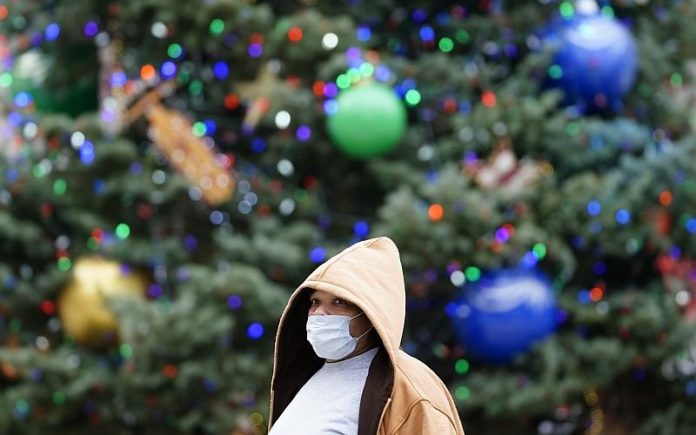
WASHINGTON: A top coronavirus adviser to president-elect Joe Biden delivered a stern holiday message to Americans on Thursday – “no Christmas parties” – and warned they face a Covid-19 siege for weeks to come despite the latest moves toward US government approval of a vaccine.
“The next three to six weeks at minimum … are our Covid weeks,” Dr Michael Osterholm, a member of Biden’s coronavirus advisory board, told CNN. “It won’t end after that, but that is the period right now where we could have a surge upon a surge upon a surge.”
Osterholm stressed that it would be several months before the nation sees widespread availability of vaccines, the first of which cleared a key US regulatory hurdle on Thursday.
A panel of outside advisers to the US Food and Drug Administration voted overwhelmingly to recommend emergency-use authorisation of a vaccine developed by Pfizer Inc and its German partner, BioNTech SE.
The FDA is expected to grant approval within days, paving the way for a mass inoculation campaign unparalleled in US history to be launched as early as next week. The advisory panel is due to review a second vaccine from Moderna Inc next week.
Nevertheless, Osterholm said sizeable quantities of vaccines would not be available to the public at large before March or April. Healthcare workers and nursing home residents are likely to be designated as first in line for the shots.
Osterholm’s blunt admonition came as Covid-19 caseloads soared higher, straining healthcare systems in cities and small towns across the country and leaving intensive care units in hundreds of hospitals at or near capacity.
He urged Americans to do their utmost to slow the contagion by limiting social interactions to members of their immediate households, and above all, “No Christmas parties”.
“There is not a safe Christmas party in this country right now,” he said.
Daily death toll exceeds 9/11
On Wednesday the daily toll of Covid-19 deaths in the US surpassed 3,000 for the first time, climbing to 3,253 fatalities.
That exceeded the loss of life from the Sept 11, 2001 attacks and pushed the total number of Americans killed by the virus since the start of the pandemic to more than 290,000.
A record 106,219 people were hospitalised with the disease as of Wednesday night, up 18% over the past two weeks, according to a Reuters tally of state-by-state data.
Pandemic hot zones abounded in rural areas and cities alike.
In California’s San Joaquin Valley agricultural region, less than 2% of intensive care unit (ICU) beds remain unoccupied, the California Department of Public Health reported on Thursday.
Available ICU capacity throughout the most populous US state has fallen to just 7.7%.
Nursing home residents and staff have been especially hard hit by Covid-19, a highly contagious respiratory virus to which the elderly and individuals with chronic health conditions are most vulnerable.
“This is a pandemic that no one has ever experienced in our lifetimes,” Stephen Hanse, president of the New York State Health Facilities Association and the New York State Center for Assisted Living, told Reuters on Thursday.
Besides the staggering human cost, the pandemic has shattered the US economy, forcing millions out of work as state and local authorities imposed sweeping restrictions on social and economic activities to curb the virus.
Many Americans, however, have resisted public health directives to wear face coverings in public and avoid large crowds.
On Thursday, Virginia Governor Ralph Northam, a medical doctor, imposed a midnight-to-5am curfew among other measures that will kick in on Monday and last through at least Jan 31.
“Case numbers have been rising for weeks. They’re higher now than they’ve ever been during this entire pandemic, Northam told a news briefing.
Governor Mike DeWine of Ohio said he was extending his state’s 10pm-to-5am curfew until Jan 2, and Pennsylvania Governor Tom Wolf, who tested positive for Covid-19 this week, announced new mitigation measures to take effect on Saturday.
Biden, who takes office on Jan 20 after defeating President Donald Trump in last month’s election, has set a goal of vaccinating 100 million people – about a third of the nation’s population – within the first 100 days of his administration.
Congress, meanwhile, has struggled to end a months-long stalemate over Covid-19 economic assistance.
Disagreements remain over business liability protections demanded by Republicans and aid to state and local governments, whose budgets have blown up by the pandemic, sought by Democrats before a final deal is reached on pandemic aid.


